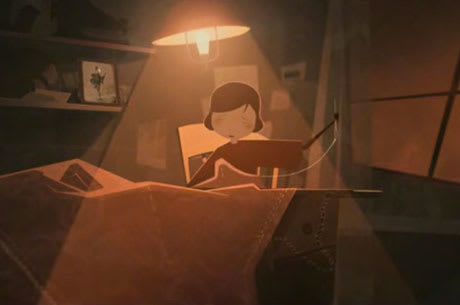Something about the nature of home and how the individual defines it speaks to their culture and sense of self. Typically, the notion of home is where one was raised and shaped by family and community, but as these shorts establish, not all tradition is universal and not all lives are shaped with the same ease.
The Seamstress posits itself as a carefree animation about the female effort to mend the world and fragile bodies of wear and tear. But as it presses forward, a gender divide takes over as a war veteran tears his stitches out, resorting to destruction as a mode of identity.
It's far more intriguing viewing than experimental Thai short Passing Through the Night, which seemingly celebrates the role of mother in as oblique a method as is possible.
We May Meet, We May Not again touches on the role of mother in the family unit, using pencil drawings to animate the maternal protective instinct turned inside out once her child grows old enough to be independent.
Clever and incisive, it transcends the annoying and insulting short Dol, where a homosexual Korean goes to a family function and watches a bunch of people make asses out of themselves over a baby and feels envious rather than piteous. This short sadly just reinforces the notion that all gays want to assimilate and be straight or heteronormative, which hasn't yet reached the cultural lexicon as offensive in a Cosby Show sort of way.
Unwieldy Beast features a busker that invented a piano bicycle talking about his inspiration. He wears sunglasses indoors, which says a lot in itself. Jumping back into animation, Walkin' on Snow Grass tells the moving story of a dormouse that learns the valuable lesson of friendship, noting that while our footprints may disappear from the world, our memories remain with us always.
This brief animation is more profound than the clichéd Newfoundland grief short that embarrassingly defines itself as a Dogme '95 film, Last of the Snow. Here, an emaciated hipster exploits a homely local child to get his depressed wife to come out and play in what little snow is left.
More profound is the disturbing Denmark/Germany coproduction, Seven Years of Winter, where a young boy is used by identity thieves to gather old passports and documents from a radiated Chernobyl. Hinting at greater political and personal tragedy, this one keeps the brain working after the credits role.
Also touching is the brief experimental mixed media short Places Other People Have Lived, where each room of a family house is examined then and now to reflect on the fleeting nature of childhood and family.
The Seamstress posits itself as a carefree animation about the female effort to mend the world and fragile bodies of wear and tear. But as it presses forward, a gender divide takes over as a war veteran tears his stitches out, resorting to destruction as a mode of identity.
It's far more intriguing viewing than experimental Thai short Passing Through the Night, which seemingly celebrates the role of mother in as oblique a method as is possible.
We May Meet, We May Not again touches on the role of mother in the family unit, using pencil drawings to animate the maternal protective instinct turned inside out once her child grows old enough to be independent.
Clever and incisive, it transcends the annoying and insulting short Dol, where a homosexual Korean goes to a family function and watches a bunch of people make asses out of themselves over a baby and feels envious rather than piteous. This short sadly just reinforces the notion that all gays want to assimilate and be straight or heteronormative, which hasn't yet reached the cultural lexicon as offensive in a Cosby Show sort of way.
Unwieldy Beast features a busker that invented a piano bicycle talking about his inspiration. He wears sunglasses indoors, which says a lot in itself. Jumping back into animation, Walkin' on Snow Grass tells the moving story of a dormouse that learns the valuable lesson of friendship, noting that while our footprints may disappear from the world, our memories remain with us always.
This brief animation is more profound than the clichéd Newfoundland grief short that embarrassingly defines itself as a Dogme '95 film, Last of the Snow. Here, an emaciated hipster exploits a homely local child to get his depressed wife to come out and play in what little snow is left.
More profound is the disturbing Denmark/Germany coproduction, Seven Years of Winter, where a young boy is used by identity thieves to gather old passports and documents from a radiated Chernobyl. Hinting at greater political and personal tragedy, this one keeps the brain working after the credits role.
Also touching is the brief experimental mixed media short Places Other People Have Lived, where each room of a family house is examined then and now to reflect on the fleeting nature of childhood and family.




